Deck 3: Quadratic and Other Special Functions
Question
Question
Question
Question
Question
Question
Question
Question
Question
Question
Question
Question
Question
Question
Question
Question
Question
Question
Question
Question
Question
Question
Question
Question
Question
Question
Question
Question
Question
Question
Question
Question
Question
Question
Question
Question
Question
Question
Question
Question
Question
Question
Question
Question
Question
Question
Question
Question
Question
Question
Question
Question
Question
Question
Question
Question
Question
Question
Question
Question
Question
Question
Question
Question
Question
Question
Question
Question
Question
Question
Question
Question
Question
Question
Question
Question
Question
Question
Question
Question

Unlock Deck
Sign up to unlock the cards in this deck!
Unlock Deck
Unlock Deck
1/113
Play
Full screen (f)
Deck 3: Quadratic and Other Special Functions
1
Solve the equation  by factoring.
by factoring.
A)
B)
C)
D)
E)
 by factoring.
by factoring. A)

B)

C)

D)

E)


2
Solve the equation below using quadratic methods. 
A)
B)
C)
D)
E)

A)

B)

C)

D)

E)


3
Find the exact real solutions of the equation  , if they exist.
, if they exist.
A)
And
B)
And
C)
And
D)
And
E)
And
 , if they exist.
, if they exist. A)

And

B)

And

C)

And

D)

And

E)

And


And

4
Find the exact real solutions to the equation, if they exist. 
A)
B)
C)
D)
E)

A)

B)

C)

D)

E)


Unlock Deck
Unlock for access to all 113 flashcards in this deck.
Unlock Deck
k this deck
5
If a ball is thrown upward at 80 feet per second from the top of a building that is 100 feet high, the height of the ball can be modeled by  , where t is the number of seconds after the ball is thrown. How long after it is thrown is the height 100 feet?
, where t is the number of seconds after the ball is thrown. How long after it is thrown is the height 100 feet?
A)
Seconds
B)
Seconds
C)
Seconds
D)
Seconds
E)
Seconds
 , where t is the number of seconds after the ball is thrown. How long after it is thrown is the height 100 feet?
, where t is the number of seconds after the ball is thrown. How long after it is thrown is the height 100 feet?A)

Seconds
B)

Seconds
C)

Seconds
D)

Seconds
E)

Seconds

Unlock Deck
Unlock for access to all 113 flashcards in this deck.
Unlock Deck
k this deck
6
The amount of airborne particulate pollution p from a power plant depends on the wind speed s, among other things, with the relationship between p and s approximated by  . Find the value of s that will make
. Find the value of s that will make  .
.
A)
B)
C)
D)
E)
 . Find the value of s that will make
. Find the value of s that will make  .
. A)

B)

C)

D)

E)


Unlock Deck
Unlock for access to all 113 flashcards in this deck.
Unlock Deck
k this deck
7
Find the exact real solutions of the equation  , if they exist.
, if they exist.
A)
And
B)
And
C)
And
D)
And
E)
And
 , if they exist.
, if they exist. A)

And

B)

And

C)

And

D)

And

E)

And


Unlock Deck
Unlock for access to all 113 flashcards in this deck.
Unlock Deck
k this deck
8
If the profit from the sale of x units of a product is  , what level(s) of production will yield a profit of $1,600?
, what level(s) of production will yield a profit of $1,600?
A)less 35 units of production.
B)more than 50 units of production.
C)85 units of production.
D)15 units of production.
E)35 or 50 units of production.
 , what level(s) of production will yield a profit of $1,600?
, what level(s) of production will yield a profit of $1,600? A)less 35 units of production.
B)more than 50 units of production.
C)85 units of production.
D)15 units of production.
E)35 or 50 units of production.

Unlock Deck
Unlock for access to all 113 flashcards in this deck.
Unlock Deck
k this deck
9
Solve the equation by using the quadratic formula. Give real solutions only. 
A)
B)
C)
D)no real solutions
E)

A)

B)

C)

D)no real solutions
E)


Unlock Deck
Unlock for access to all 113 flashcards in this deck.
Unlock Deck
k this deck
10
Solve the equation  by using a graphing utility. Round your answers to two decimal places.
by using a graphing utility. Round your answers to two decimal places.
A)
And
B)
And
C)
And
D)
And
E)
And
 by using a graphing utility. Round your answers to two decimal places.
by using a graphing utility. Round your answers to two decimal places. A)

And

B)

And

C)

And

D)

And

E)

And


Unlock Deck
Unlock for access to all 113 flashcards in this deck.
Unlock Deck
k this deck
11
Solve the equation  by first multiplying by the LCD, and then solving the resulting equation.
by first multiplying by the LCD, and then solving the resulting equation.
A)
B)
C)
D)
E)
 by first multiplying by the LCD, and then solving the resulting equation.
by first multiplying by the LCD, and then solving the resulting equation. A)

B)

C)

D)

E)


Unlock Deck
Unlock for access to all 113 flashcards in this deck.
Unlock Deck
k this deck
12
Write the equation  in general form.
in general form.
A)
B)
C)
D)
E)
 in general form.
in general form. A)

B)

C)

D)

E)


Unlock Deck
Unlock for access to all 113 flashcards in this deck.
Unlock Deck
k this deck
13
Write the equation  in general form.
in general form.
A)
B)
C)
D)
E)
 in general form.
in general form. A)

B)

C)

D)

E)


Unlock Deck
Unlock for access to all 113 flashcards in this deck.
Unlock Deck
k this deck
14
The sensitivity S to a drug is related to the dosage size by  , where x is the dosage size in milliliters. Determine all dosages that yield 0 sensitivity.
, where x is the dosage size in milliliters. Determine all dosages that yield 0 sensitivity.
A)
Milliliters,
Milliliters
B)
Milliliters,
Milliliters
C)
Milliliters,
Milliliters
D)
Milliliters,
Milliliters
E)
Milliliters
 , where x is the dosage size in milliliters. Determine all dosages that yield 0 sensitivity.
, where x is the dosage size in milliliters. Determine all dosages that yield 0 sensitivity. A)

Milliliters,

Milliliters
B)

Milliliters,

Milliliters
C)

Milliliters,

Milliliters
D)

Milliliters,

Milliliters
E)

Milliliters

Unlock Deck
Unlock for access to all 113 flashcards in this deck.
Unlock Deck
k this deck
15
Find the exact real solutions of the equation  , if they exist.
, if they exist.
A)
And
B)
And
C)
And
D)
And
E)Real solutions do not exist.
 , if they exist.
, if they exist. A)

And

B)

And

C)

And

D)

And

E)Real solutions do not exist.

Unlock Deck
Unlock for access to all 113 flashcards in this deck.
Unlock Deck
k this deck
16
Solve the equation by using a graphing utility. 
A)
B)
C)
D)
E)

A)

B)

C)

D)

E)


Unlock Deck
Unlock for access to all 113 flashcards in this deck.
Unlock Deck
k this deck
17
Solve the equation  .
.
A)
B)
C)
D)
E)
 .
. A)

B)

C)

D)

E)


Unlock Deck
Unlock for access to all 113 flashcards in this deck.
Unlock Deck
k this deck
18
Multiply both sides of the equation  by the LCD, and then solve the resulting quadratic equation.
by the LCD, and then solve the resulting quadratic equation.
A)
B)
C)
D)
E)
 by the LCD, and then solve the resulting quadratic equation.
by the LCD, and then solve the resulting quadratic equation. A)

B)

C)

D)

E)


Unlock Deck
Unlock for access to all 113 flashcards in this deck.
Unlock Deck
k this deck
19
Find the exact real solutions to the equation, if they exist. 
A)
B)
C)
D)
E)no real solutions

A)

B)

C)

D)

E)no real solutions

Unlock Deck
Unlock for access to all 113 flashcards in this deck.
Unlock Deck
k this deck
20
Solve the equation by using the quadratic formula. Give real answers rounded to two decimal places. 
A)
B)
C)
D)
E)

A)

B)

C)

D)

E)


Unlock Deck
Unlock for access to all 113 flashcards in this deck.
Unlock Deck
k this deck
21
The time t, in seconds, that it takes a 2005 Corvette to accelerate to x mph can be described by  . How fast is the Corvette going after 9.08 seconds? Give your answer to the nearest tenth.
. How fast is the Corvette going after 9.08 seconds? Give your answer to the nearest tenth.
A)97.1 mph
B)98.1 mph
C)100.1 mph
D)118.9 mph
E)119.4 mph
 . How fast is the Corvette going after 9.08 seconds? Give your answer to the nearest tenth.
. How fast is the Corvette going after 9.08 seconds? Give your answer to the nearest tenth. A)97.1 mph
B)98.1 mph
C)100.1 mph
D)118.9 mph
E)119.4 mph

Unlock Deck
Unlock for access to all 113 flashcards in this deck.
Unlock Deck
k this deck
22
Determine whether the function's vertex is a maximum point or a minimum point and find the coordinates of this point. 
A)vertex:
, a minimum point
B)vertex:
, a maximum point
C)vertex:
, a minimum point
D)vertex:
, a maximum point
E)vertex:
, a maximum point

A)vertex:

, a minimum point
B)vertex:

, a maximum point
C)vertex:

, a minimum point
D)vertex:

, a maximum point
E)vertex:

, a maximum point

Unlock Deck
Unlock for access to all 113 flashcards in this deck.
Unlock Deck
k this deck
23
Find the x-intercepts, if any exist. Round your answers to two decimal places. 
A)x-intercepts:
,
B)x-intercepts:
,
C)x-intercepts:
,
D)x-intercepts:
,
E)no x-intercepts

A)x-intercepts:

,

B)x-intercepts:

,

C)x-intercepts:

,

D)x-intercepts:

,

E)no x-intercepts

Unlock Deck
Unlock for access to all 113 flashcards in this deck.
Unlock Deck
k this deck
24
Sketch the graph of the following function by using graphing calculator. 
A)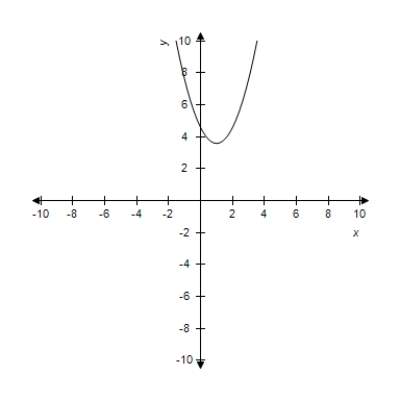
B)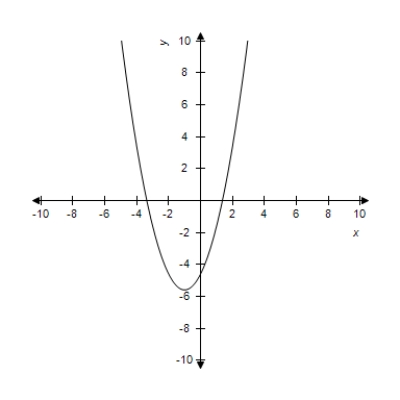
C)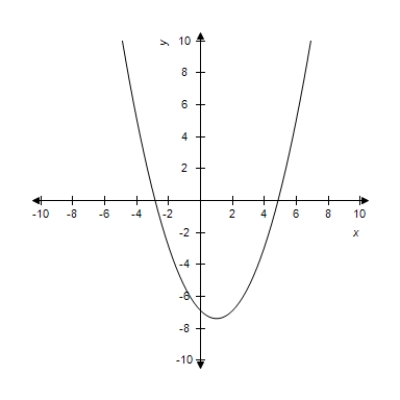
D)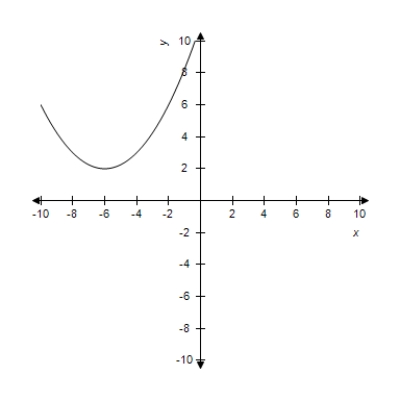
E)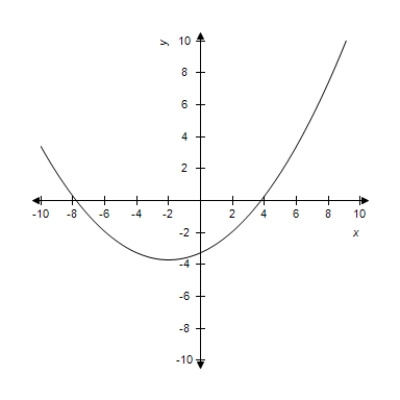

A)

B)

C)

D)

E)


Unlock Deck
Unlock for access to all 113 flashcards in this deck.
Unlock Deck
k this deck
25
Find the average rate of change of the function between the given values of x.  between
between  and
and  .
.
A)7
B)6
C)0
D)-6
E)12
 between
between  and
and  .
.A)7
B)6
C)0
D)-6
E)12

Unlock Deck
Unlock for access to all 113 flashcards in this deck.
Unlock Deck
k this deck
26
Use a graphing utility to find the vertex of the function. Round your answer to two decimal places. 
A)vertex:
B)vertex: origin
C)vertex:
D)vertex:
E)vertex:

A)vertex:

B)vertex: origin
C)vertex:

D)vertex:

E)vertex:


Unlock Deck
Unlock for access to all 113 flashcards in this deck.
Unlock Deck
k this deck
27
Find the zeros, if any exist. Round your answers to two decimal places. 
A)zeros at -2.17 and -7.83
B)zeros at 0 and 10.00
C)zeros at 11.00 and -21.00
D)no zeros
E)zeros at 0 and 27.00

A)zeros at -2.17 and -7.83
B)zeros at 0 and 10.00
C)zeros at 11.00 and -21.00
D)no zeros
E)zeros at 0 and 27.00

Unlock Deck
Unlock for access to all 113 flashcards in this deck.
Unlock Deck
k this deck
28
Find the vertex and then determine the range of the function. 
A)all values greater than or equal to 67
B)all values less than or equal to 63
C)all values greater than or equal to 10
D)all values less than or equal to 85
E)all values less than or equal to 67

A)all values greater than or equal to 67
B)all values less than or equal to 63
C)all values greater than or equal to 10
D)all values less than or equal to 85
E)all values less than or equal to 67

Unlock Deck
Unlock for access to all 113 flashcards in this deck.
Unlock Deck
k this deck
29
Suppose that the percent of total personal income that is used to pay personal taxes is given by  , where x is the number of years past 1990 (Source: Bureau of Economic Analysis, U.S. Department of Commerce). Find the year or years when the percent of total personal income used to pay personal taxes is 20 percent.
, where x is the number of years past 1990 (Source: Bureau of Economic Analysis, U.S. Department of Commerce). Find the year or years when the percent of total personal income used to pay personal taxes is 20 percent.
A)2015
B)2005
C)2004
D)2010
E)2050
 , where x is the number of years past 1990 (Source: Bureau of Economic Analysis, U.S. Department of Commerce). Find the year or years when the percent of total personal income used to pay personal taxes is 20 percent.
, where x is the number of years past 1990 (Source: Bureau of Economic Analysis, U.S. Department of Commerce). Find the year or years when the percent of total personal income used to pay personal taxes is 20 percent. A)2015
B)2005
C)2004
D)2010
E)2050

Unlock Deck
Unlock for access to all 113 flashcards in this deck.
Unlock Deck
k this deck
30
Determine what value of x gives the optimal value of the function, and determine the optimal (maximum or minimum) value. Round your answers to two decimal places. 
A)optimal value of x: 0, optimal value: 1.00
B)optimal value of x: -1.13, optimal value: 0.75
C)optimal value of x: 1.50, optimal value: -1.50
D)optimal value of x: -0.75, optimal value: -1.13
E)optimal value of x: 0.75, optimal value: -1.13

A)optimal value of x: 0, optimal value: 1.00
B)optimal value of x: -1.13, optimal value: 0.75
C)optimal value of x: 1.50, optimal value: -1.50
D)optimal value of x: -0.75, optimal value: -1.13
E)optimal value of x: 0.75, optimal value: -1.13

Unlock Deck
Unlock for access to all 113 flashcards in this deck.
Unlock Deck
k this deck
31
The model for body-heat loss depends on the coefficient of convection K, which depends on wind speed v according to the equation  where v is in miles per hour. Find the positive coefficient of convection when the wind speed is 42 mph. Round your answer to the nearest integer.
where v is in miles per hour. Find the positive coefficient of convection when the wind speed is 42 mph. Round your answer to the nearest integer.
A)
B)
C)
D)
E)
 where v is in miles per hour. Find the positive coefficient of convection when the wind speed is 42 mph. Round your answer to the nearest integer.
where v is in miles per hour. Find the positive coefficient of convection when the wind speed is 42 mph. Round your answer to the nearest integer. A)

B)

C)

D)

E)


Unlock Deck
Unlock for access to all 113 flashcards in this deck.
Unlock Deck
k this deck
32
Determine whether the vertex of the graph of the following function is a maximum point or a minimum point. Also find the coordinates of the vertex. 
A)vertex:
, a maximum point
B)vertex:
, a minimum point
C)vertex:
, a minimum point
D)vertex:
, a minimum point
E)vertex:
, a maximum point

A)vertex:

, a maximum point
B)vertex:

, a minimum point
C)vertex:

, a minimum point
D)vertex:

, a minimum point
E)vertex:

, a maximum point

Unlock Deck
Unlock for access to all 113 flashcards in this deck.
Unlock Deck
k this deck
33
How is the graph of  shifted to obtain the graph of the function
shifted to obtain the graph of the function  ?
?
A)shifted 3 units to the left and 6 units up
B)shifted 3 units to the right and 6 units down
C)shifted 9 units to the left and 6 units up
D)shifted 6 units to the right and 6 units down
E)shifted 3 units to the right and 6 units up
 shifted to obtain the graph of the function
shifted to obtain the graph of the function  ?
? A)shifted 3 units to the left and 6 units up
B)shifted 3 units to the right and 6 units down
C)shifted 9 units to the left and 6 units up
D)shifted 6 units to the right and 6 units down
E)shifted 3 units to the right and 6 units up

Unlock Deck
Unlock for access to all 113 flashcards in this deck.
Unlock Deck
k this deck
34
An equation that models the number of users of the Internet is  million users, where x is the number of years past 1990 (Source: CyberAtlas, 1999). If the pattern indicated by the model remains valid, when does this model predict there will be 1,100 million users?
million users, where x is the number of years past 1990 (Source: CyberAtlas, 1999). If the pattern indicated by the model remains valid, when does this model predict there will be 1,100 million users?
A)2004
B)2021
C)2014
D)2007
E)2005
 million users, where x is the number of years past 1990 (Source: CyberAtlas, 1999). If the pattern indicated by the model remains valid, when does this model predict there will be 1,100 million users?
million users, where x is the number of years past 1990 (Source: CyberAtlas, 1999). If the pattern indicated by the model remains valid, when does this model predict there will be 1,100 million users? A)2004
B)2021
C)2014
D)2007
E)2005

Unlock Deck
Unlock for access to all 113 flashcards in this deck.
Unlock Deck
k this deck
35
Find the vertex of the graph of the equation  . Round your answer to two decimal places.
. Round your answer to two decimal places.
A)
B)
C)
D)
E)
 . Round your answer to two decimal places.
. Round your answer to two decimal places.A)

B)

C)

D)

E)


Unlock Deck
Unlock for access to all 113 flashcards in this deck.
Unlock Deck
k this deck
36
A fissure in the earth appeared after an earthquake. To measure its vertical depth, a stone was dropped into it, and the sound of the stone's impact was heard 3.3 seconds later. The distance (in feet) the stone fell is given by  , and the distance (in feet) the sound traveled is given by
, and the distance (in feet) the sound traveled is given by  . In these equations, the distances traveled by the sound and the stone are the same, but their times are not. Using the fact that the total time is 3.3 seconds, find the depth of the fissure. Round your answer to two decimal places.
. In these equations, the distances traveled by the sound and the stone are the same, but their times are not. Using the fact that the total time is 3.3 seconds, find the depth of the fissure. Round your answer to two decimal places.
A)94.19 feet
B)91.00 feet
C)121.98 feet
D)126.38 feet
E)126.48 feet
 , and the distance (in feet) the sound traveled is given by
, and the distance (in feet) the sound traveled is given by  . In these equations, the distances traveled by the sound and the stone are the same, but their times are not. Using the fact that the total time is 3.3 seconds, find the depth of the fissure. Round your answer to two decimal places.
. In these equations, the distances traveled by the sound and the stone are the same, but their times are not. Using the fact that the total time is 3.3 seconds, find the depth of the fissure. Round your answer to two decimal places. A)94.19 feet
B)91.00 feet
C)121.98 feet
D)126.38 feet
E)126.48 feet

Unlock Deck
Unlock for access to all 113 flashcards in this deck.
Unlock Deck
k this deck
37
Find the vertex of the graph of the equation  .
.
A)
B)
C)
D)
E)
 .
. A)

B)

C)

D)

E)


Unlock Deck
Unlock for access to all 113 flashcards in this deck.
Unlock Deck
k this deck
38
Use a graphing utility to approximate the solutions to  . Round your answers to two decimal places.
. Round your answers to two decimal places. 
A)
B)
C)
D)
E)
 . Round your answers to two decimal places.
. Round your answers to two decimal places. 
A)

B)

C)

D)

E)


Unlock Deck
Unlock for access to all 113 flashcards in this deck.
Unlock Deck
k this deck
39
Determine if the vertex of the graph of the equation is a maximum or minumim point. 
A)vertex is at a maximum point
B)vertex is at a minimum point
C)has no vertex

A)vertex is at a maximum point
B)vertex is at a minimum point
C)has no vertex

Unlock Deck
Unlock for access to all 113 flashcards in this deck.
Unlock Deck
k this deck
40
Sketch the graph of the following function. 
A)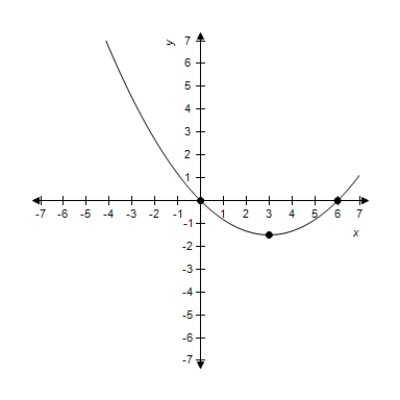
B)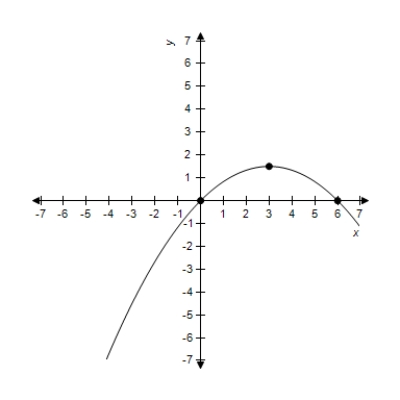
C)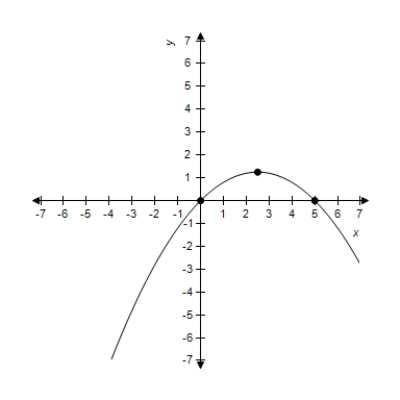
D)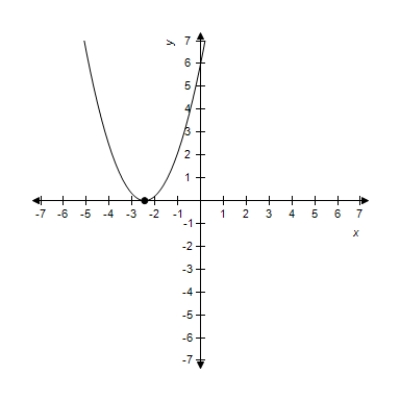
E)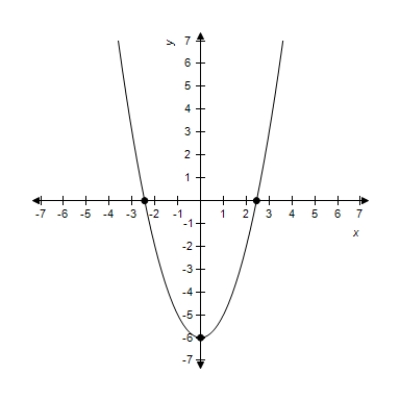

A)

B)

C)

D)

E)


Unlock Deck
Unlock for access to all 113 flashcards in this deck.
Unlock Deck
k this deck
41
If a firm has the following cost and revenue functions, find the break-even points. 
A)Break-even values are at
And
Units.
B)Break-even values are at
And
Units.
C)Break-even values are at
And
Units.
D)Break-even values are at
And
Units.
E)Break-even values are at
And
Units.

A)Break-even values are at

And

Units.
B)Break-even values are at

And

Units.
C)Break-even values are at

And

Units.
D)Break-even values are at

And

Units.
E)Break-even values are at

And

Units.

Unlock Deck
Unlock for access to all 113 flashcards in this deck.
Unlock Deck
k this deck
42
The total costs for a company are given by  , and the total revenues are given by
, and the total revenues are given by  . Find the break-even points.
. Find the break-even points.
A)Break-even values are at
And
Units.
B)Break-even values are at
Units.
C)Break-even values are at
Units.
D)Break-even values are at
And
Units.
E)Break-even values are at
Units.
 , and the total revenues are given by
, and the total revenues are given by  . Find the break-even points.
. Find the break-even points. A)Break-even values are at

And

Units.
B)Break-even values are at

Units.
C)Break-even values are at

Units.
D)Break-even values are at

And

Units.
E)Break-even values are at

Units.

Unlock Deck
Unlock for access to all 113 flashcards in this deck.
Unlock Deck
k this deck
43
Sketch the first quadrant portions of the following functions and estimate the market equilibrium point.
Supply: Demand:
Demand: 
A)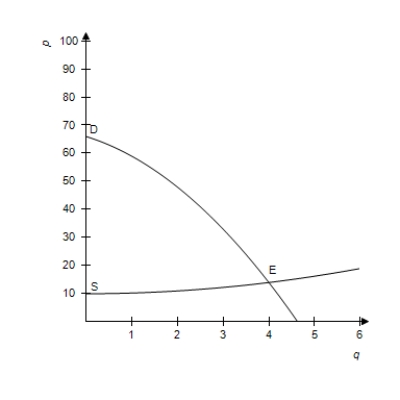

B)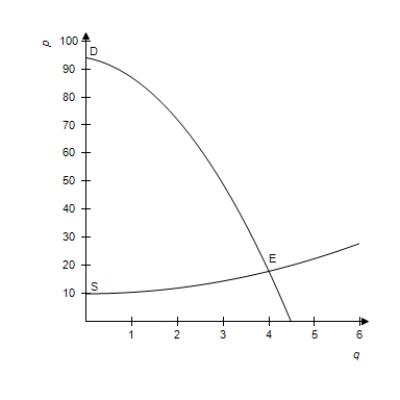

C)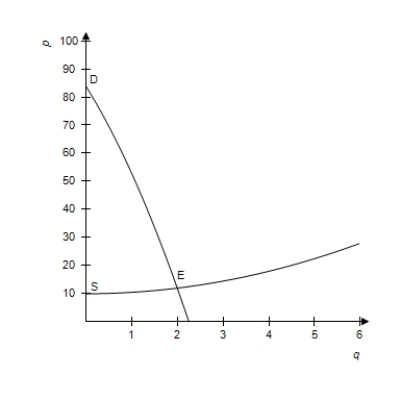

D)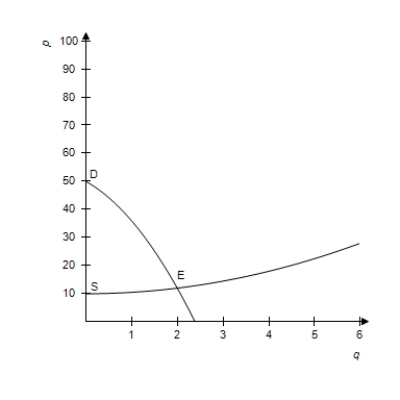

E)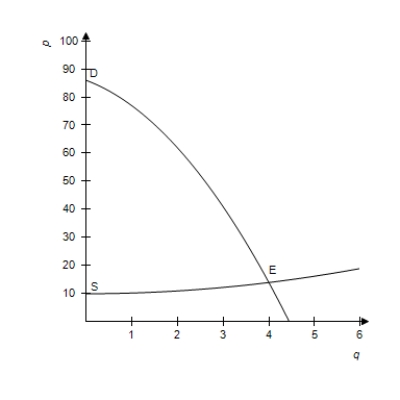

Supply:
 Demand:
Demand: 
A)


B)


C)


D)


E)



Unlock Deck
Unlock for access to all 113 flashcards in this deck.
Unlock Deck
k this deck
44
A supply function has the equation is  , and the demand function is decribed by the equation
, and the demand function is decribed by the equation  . Algebraically determine the equilibrium point for the supply and demand functions. Round your answer to two decimal places.
. Algebraically determine the equilibrium point for the supply and demand functions. Round your answer to two decimal places.
A)
B)
C)
D)
E)
 , and the demand function is decribed by the equation
, and the demand function is decribed by the equation  . Algebraically determine the equilibrium point for the supply and demand functions. Round your answer to two decimal places.
. Algebraically determine the equilibrium point for the supply and demand functions. Round your answer to two decimal places. A)

B)

C)

D)

E)


Unlock Deck
Unlock for access to all 113 flashcards in this deck.
Unlock Deck
k this deck
45
The daily profit from the sale of a product is given by  dollars. What is the maximum possible profit? Round intermediate calculations and final answer to the nearest dollar.
dollars. What is the maximum possible profit? Round intermediate calculations and final answer to the nearest dollar.
A)$532
B)$860
C)$220
D)$40
E)$73
 dollars. What is the maximum possible profit? Round intermediate calculations and final answer to the nearest dollar.
dollars. What is the maximum possible profit? Round intermediate calculations and final answer to the nearest dollar.A)$532
B)$860
C)$220
D)$40
E)$73

Unlock Deck
Unlock for access to all 113 flashcards in this deck.
Unlock Deck
k this deck
46
The sensitivity S to a drug is related to the dosage x in milligrams by  . Use a graphing utility to determine what dosage gives maximum sensitivity.
. Use a graphing utility to determine what dosage gives maximum sensitivity.
A)97
B)235,225
C)970, 0
D)970
E)485
 . Use a graphing utility to determine what dosage gives maximum sensitivity.
. Use a graphing utility to determine what dosage gives maximum sensitivity. A)97
B)235,225
C)970, 0
D)970
E)485

Unlock Deck
Unlock for access to all 113 flashcards in this deck.
Unlock Deck
k this deck
47
A ball thrown vertically into the air has its height above ground given by  , where t is in seconds and s is in feet. Find the maximum height of the ball.
, where t is in seconds and s is in feet. Find the maximum height of the ball.
A)242 feet
B)121 feet
C)8 feet
D)16 feet
E)229 feet
 , where t is in seconds and s is in feet. Find the maximum height of the ball.
, where t is in seconds and s is in feet. Find the maximum height of the ball. A)242 feet
B)121 feet
C)8 feet
D)16 feet
E)229 feet

Unlock Deck
Unlock for access to all 113 flashcards in this deck.
Unlock Deck
k this deck
48
If the supply and demand functions for a commodity are given by  and
and  , what is the equilibrium price and what is the corresponding number of units supplied and demanded? Round your answer to two decimal places.
, what is the equilibrium price and what is the corresponding number of units supplied and demanded? Round your answer to two decimal places.
A)
B)
C)
D)
E)
 and
and  , what is the equilibrium price and what is the corresponding number of units supplied and demanded? Round your answer to two decimal places.
, what is the equilibrium price and what is the corresponding number of units supplied and demanded? Round your answer to two decimal places. A)

B)

C)

D)

E)


Unlock Deck
Unlock for access to all 113 flashcards in this deck.
Unlock Deck
k this deck
49
The yield in bushels from a grove of orange trees is given by  , where x is the number of orange trees per acre. How many trees will maximize the yield?
, where x is the number of orange trees per acre. How many trees will maximize the yield?
A)1,000 trees
B)2,000 trees
C)550 trees
D)1,050 trees
E)500 trees
 , where x is the number of orange trees per acre. How many trees will maximize the yield?
, where x is the number of orange trees per acre. How many trees will maximize the yield? A)1,000 trees
B)2,000 trees
C)550 trees
D)1,050 trees
E)500 trees

Unlock Deck
Unlock for access to all 113 flashcards in this deck.
Unlock Deck
k this deck
50
The supply function for a product is  , while the demand function for the same product is
, while the demand function for the same product is  . Find the market equilibrium point E(q, p). Round your final answer to two decimal places.
. Find the market equilibrium point E(q, p). Round your final answer to two decimal places.
A)
B)
C)
D)
E)
 , while the demand function for the same product is
, while the demand function for the same product is  . Find the market equilibrium point E(q, p). Round your final answer to two decimal places.
. Find the market equilibrium point E(q, p). Round your final answer to two decimal places. A)

B)

C)

D)

E)


Unlock Deck
Unlock for access to all 113 flashcards in this deck.
Unlock Deck
k this deck
51
If the supply function for a commodity is  and the demand function is
and the demand function is  , find the equilibrium quantity and equilibrium price. Round your final answer to two decimal places.
, find the equilibrium quantity and equilibrium price. Round your final answer to two decimal places.
A)
B)
C)
D)
E)
 and the demand function is
and the demand function is  , find the equilibrium quantity and equilibrium price. Round your final answer to two decimal places.
, find the equilibrium quantity and equilibrium price. Round your final answer to two decimal places.A)

B)

C)

D)

E)


Unlock Deck
Unlock for access to all 113 flashcards in this deck.
Unlock Deck
k this deck
52
The owner of a skating rink rents the rink for parties at $696 if 58 or fewer skaters attend, so that the cost per person is $12 if 58 attend. For each 5 skaters above 58, she reduces the price per skater by $0.50. Which table gives the revenue generated if 58, 68, and 78 skaters attend?
A)
B)
C)
D)
E)
A)

B)

C)

D)

E)


Unlock Deck
Unlock for access to all 113 flashcards in this deck.
Unlock Deck
k this deck
53
The daily profit from the sale of a product is given by  dollars. What is the maximum possible profit? Round intermediate calculations and final answer to the nearest dollar.
dollars. What is the maximum possible profit? Round intermediate calculations and final answer to the nearest dollar.
A)$5,423
B)$16,685
C)$11,013
D)$137
E)$271
 dollars. What is the maximum possible profit? Round intermediate calculations and final answer to the nearest dollar.
dollars. What is the maximum possible profit? Round intermediate calculations and final answer to the nearest dollar. A)$5,423
B)$16,685
C)$11,013
D)$137
E)$271

Unlock Deck
Unlock for access to all 113 flashcards in this deck.
Unlock Deck
k this deck
54
The supply function for a product is  , while the demand function for the same product is
, while the demand function for the same product is  . If a $22 tax is placed on production of the item, then the supplier passes this tax on by adding $22 to his selling price. Find the new equilibrium point E(q, p) for this product when the tax is passed on. (The new supply function is given by
. If a $22 tax is placed on production of the item, then the supplier passes this tax on by adding $22 to his selling price. Find the new equilibrium point E(q, p) for this product when the tax is passed on. (The new supply function is given by  .) Round your final answer to two decimal places.
.) Round your final answer to two decimal places.
A)
B)
C)
D)
E)
 , while the demand function for the same product is
, while the demand function for the same product is  . If a $22 tax is placed on production of the item, then the supplier passes this tax on by adding $22 to his selling price. Find the new equilibrium point E(q, p) for this product when the tax is passed on. (The new supply function is given by
. If a $22 tax is placed on production of the item, then the supplier passes this tax on by adding $22 to his selling price. Find the new equilibrium point E(q, p) for this product when the tax is passed on. (The new supply function is given by  .) Round your final answer to two decimal places.
.) Round your final answer to two decimal places. A)

B)

C)

D)

E)


Unlock Deck
Unlock for access to all 113 flashcards in this deck.
Unlock Deck
k this deck
55
If the supply and demand functions for a commodity are given by  and
and  , respectively, find the price that will result in market equilibrium.
, respectively, find the price that will result in market equilibrium.
A)41
B)150
C)33
D)31
E)25
 and
and  , respectively, find the price that will result in market equilibrium.
, respectively, find the price that will result in market equilibrium. A)41
B)150
C)33
D)31
E)25

Unlock Deck
Unlock for access to all 113 flashcards in this deck.
Unlock Deck
k this deck
56
When a stone is thrown upward, it follows a parabolic path given by a form of the equation  . If
. If  represents ground level, find the equation of a stone that is thrown from ground level at
represents ground level, find the equation of a stone that is thrown from ground level at  and lands on the ground 130 units away if the stone reaches a maximum height of 130 units.
and lands on the ground 130 units away if the stone reaches a maximum height of 130 units.
A)
B)
C)
D)
E)
 . If
. If  represents ground level, find the equation of a stone that is thrown from ground level at
represents ground level, find the equation of a stone that is thrown from ground level at  and lands on the ground 130 units away if the stone reaches a maximum height of 130 units.
and lands on the ground 130 units away if the stone reaches a maximum height of 130 units. A)

B)

C)

D)

E)


Unlock Deck
Unlock for access to all 113 flashcards in this deck.
Unlock Deck
k this deck
57
Solve  for the function
for the function  .
.
A)
B)
C)
D)
E)no real solutions
 for the function
for the function  .
. A)

B)

C)

D)

E)no real solutions

Unlock Deck
Unlock for access to all 113 flashcards in this deck.
Unlock Deck
k this deck
58
Factor the function  .
.
A)
B)
C)
D)
E)
 .
. A)

B)

C)

D)

E)


Unlock Deck
Unlock for access to all 113 flashcards in this deck.
Unlock Deck
k this deck
59
In 1995, America's 45 million Social Security recipients received a 2.6% cost-of-living increase, the second smallest increase in nearly 20 years, a reflection of lower inflation. The percent increase might be described by the function  , where t is the number of years past 1980. In what year does the model predict the highest cost of living percent increase?
, where t is the number of years past 1980. In what year does the model predict the highest cost of living percent increase?
A)1990
B)2009
C)1987
D)1989
E)none of the above
 , where t is the number of years past 1980. In what year does the model predict the highest cost of living percent increase?
, where t is the number of years past 1980. In what year does the model predict the highest cost of living percent increase? A)1990
B)2009
C)1987
D)1989
E)none of the above

Unlock Deck
Unlock for access to all 113 flashcards in this deck.
Unlock Deck
k this deck
60
The daily profit from the sale of a product is given by  dollars. What level of production maximizes profit?
dollars. What level of production maximizes profit?
A)production level of 100 units
B)production level of 10 units
C)production level of 5 units
D)production level of 50 units
E)production level of 95 units
 dollars. What level of production maximizes profit?
dollars. What level of production maximizes profit? A)production level of 100 units
B)production level of 10 units
C)production level of 5 units
D)production level of 50 units
E)production level of 95 units

Unlock Deck
Unlock for access to all 113 flashcards in this deck.
Unlock Deck
k this deck
61
Suppose a company has fixed costs of $27,000 and variable costs of  dollars per unit, where x is the total number of units produced. Suppose further that the selling price of its product is
dollars per unit, where x is the total number of units produced. Suppose further that the selling price of its product is  dollars per unit. Find the maximum revenue. Round your answer to the nearest cent.
dollars per unit. Find the maximum revenue. Round your answer to the nearest cent.
A)Maximum revenue is $1,026.70.
B)Maximum revenue is $27,000.00.
C)Maximum revenue is $26,862.50.
D)Maximum revenue is $677,343.75.
E)Maximum revenue is $612.50.
 dollars per unit, where x is the total number of units produced. Suppose further that the selling price of its product is
dollars per unit, where x is the total number of units produced. Suppose further that the selling price of its product is  dollars per unit. Find the maximum revenue. Round your answer to the nearest cent.
dollars per unit. Find the maximum revenue. Round your answer to the nearest cent. A)Maximum revenue is $1,026.70.
B)Maximum revenue is $27,000.00.
C)Maximum revenue is $26,862.50.
D)Maximum revenue is $677,343.75.
E)Maximum revenue is $612.50.

Unlock Deck
Unlock for access to all 113 flashcards in this deck.
Unlock Deck
k this deck
62
Sketch the graph of the function  .
.
A)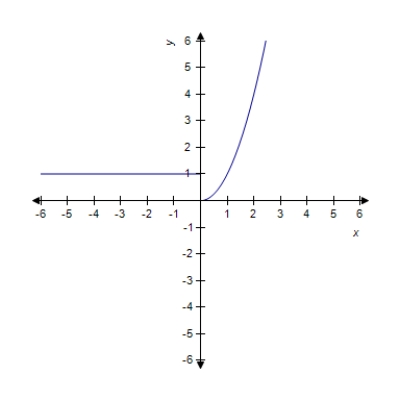
B)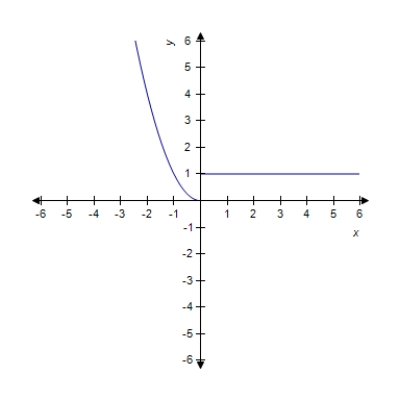
C)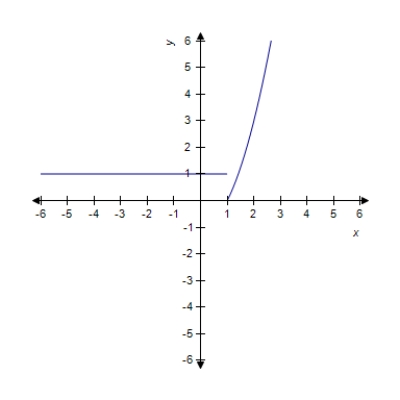
D)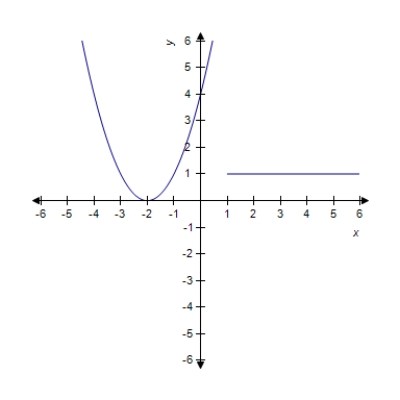
E)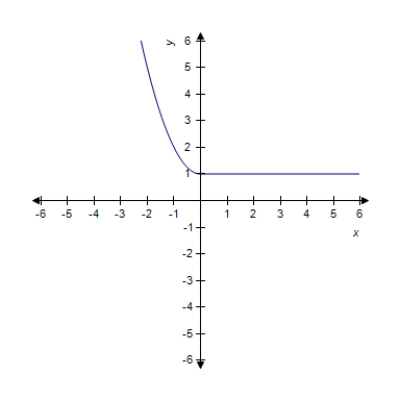
 .
. A)

B)

C)

D)

E)


Unlock Deck
Unlock for access to all 113 flashcards in this deck.
Unlock Deck
k this deck
63
Form the profit function for the cost and revenue functions, where the total costs and total revenues are given by  and
and  .
.
A)
B)
C)
D)
E)
 and
and  .
. A)

B)

C)

D)

E)


Unlock Deck
Unlock for access to all 113 flashcards in this deck.
Unlock Deck
k this deck
64
Sketch the graph of the function  .
.
A)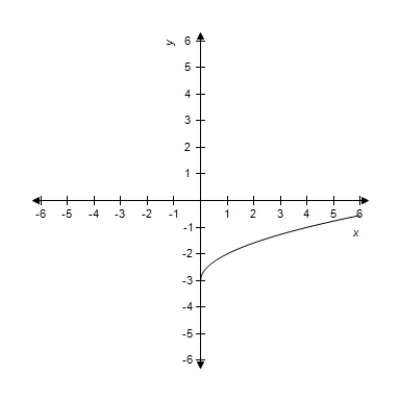
B)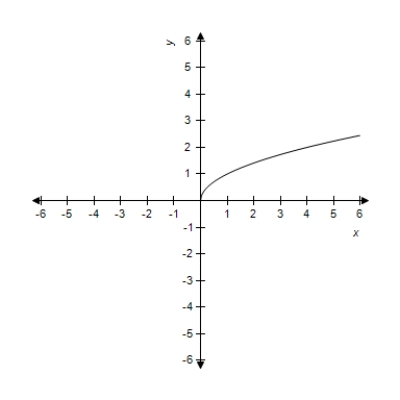
C)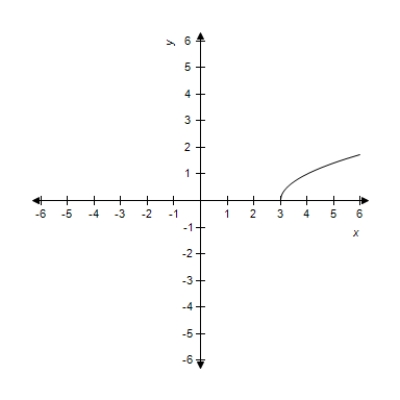
D)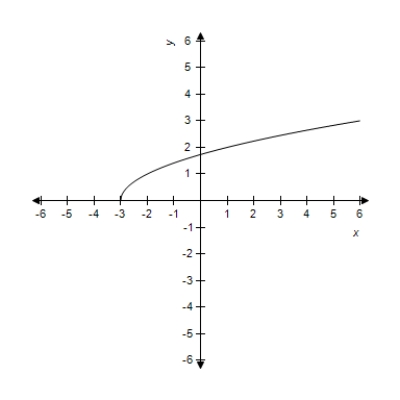
E)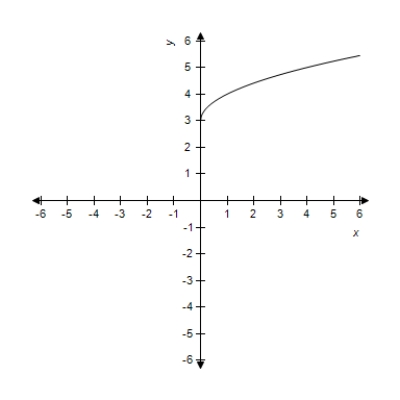
 .
. A)

B)

C)

D)

E)


Unlock Deck
Unlock for access to all 113 flashcards in this deck.
Unlock Deck
k this deck
65
If total costs are  and total revenues are
and total revenues are  , find the break-even points.
, find the break-even points.
A)Break-even values are at
And
Units.
B)Break-even values are at
And
Units.
C)Break-even values are at
And
Units.
D)Break-even values are at
And
Units.
E)Break-even values are at
And
Units.
 and total revenues are
and total revenues are  , find the break-even points.
, find the break-even points. A)Break-even values are at

And

Units.
B)Break-even values are at

And

Units.
C)Break-even values are at

And

Units.
D)Break-even values are at

And

Units.
E)Break-even values are at

And

Units.

Unlock Deck
Unlock for access to all 113 flashcards in this deck.
Unlock Deck
k this deck
66
Assume that sales revenues, in millions, for Continental Divide Mining can be described by  , where t is the number of years past 1992. Use the function to find the maximum revenue. Round your answers to three decimal places.
, where t is the number of years past 1992. Use the function to find the maximum revenue. Round your answers to three decimal places.
A)Maximum revenue is $9.463 million.
B)Maximum revenue is $5.971 million.
C)Maximum revenue is $3.672 million.
D)Maximum revenue is $3.851 million.
E)Maximum revenue is $16.986 million.
 , where t is the number of years past 1992. Use the function to find the maximum revenue. Round your answers to three decimal places.
, where t is the number of years past 1992. Use the function to find the maximum revenue. Round your answers to three decimal places. A)Maximum revenue is $9.463 million.
B)Maximum revenue is $5.971 million.
C)Maximum revenue is $3.672 million.
D)Maximum revenue is $3.851 million.
E)Maximum revenue is $16.986 million.

Unlock Deck
Unlock for access to all 113 flashcards in this deck.
Unlock Deck
k this deck
67
If a company has total costs  , and total revenues given by
, and total revenues given by  , find the break-even points. Round your answers to two decimal places.
, find the break-even points. Round your answers to two decimal places.
A)Break-even values are at
And
Units.
B)Break-even values are at
And
Units.
C)Break-even values are at
Units.
D)Break-even values are at
Units.
E)Break-even values are at
And
Units.
 , and total revenues given by
, and total revenues given by  , find the break-even points. Round your answers to two decimal places.
, find the break-even points. Round your answers to two decimal places.A)Break-even values are at

And

Units.
B)Break-even values are at

And

Units.
C)Break-even values are at

Units.
D)Break-even values are at

Units.
E)Break-even values are at

And

Units.

Unlock Deck
Unlock for access to all 113 flashcards in this deck.
Unlock Deck
k this deck
68
Given the profit function,  , and that production is restricted to fewer than 75 units, find the break-even point(s). Round your answer to two decimal places.
, and that production is restricted to fewer than 75 units, find the break-even point(s). Round your answer to two decimal places.
A)Break-even value is at
Units.
B)Break-even value is at
Units.
C)Break-even value is at
Units.
D)Break-even value is at
Units.
E)Break-even value is at
Units.
 , and that production is restricted to fewer than 75 units, find the break-even point(s). Round your answer to two decimal places.
, and that production is restricted to fewer than 75 units, find the break-even point(s). Round your answer to two decimal places. A)Break-even value is at

Units.
B)Break-even value is at

Units.
C)Break-even value is at

Units.
D)Break-even value is at

Units.
E)Break-even value is at

Units.

Unlock Deck
Unlock for access to all 113 flashcards in this deck.
Unlock Deck
k this deck
69
The graph of the profit function  is given as follows. Consider the average rate of change of the profit from a to 350 where a lies to the left of 350. Does the average rate of change of the profit get closer to 0 or farther from 0 as a gets closer to 350?
is given as follows. Consider the average rate of change of the profit from a to 350 where a lies to the left of 350. Does the average rate of change of the profit get closer to 0 or farther from 0 as a gets closer to 350? 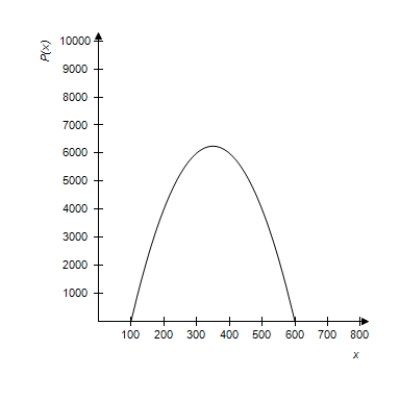
A)closer to 0
B)farther from 0
 is given as follows. Consider the average rate of change of the profit from a to 350 where a lies to the left of 350. Does the average rate of change of the profit get closer to 0 or farther from 0 as a gets closer to 350?
is given as follows. Consider the average rate of change of the profit from a to 350 where a lies to the left of 350. Does the average rate of change of the profit get closer to 0 or farther from 0 as a gets closer to 350? 
A)closer to 0
B)farther from 0

Unlock Deck
Unlock for access to all 113 flashcards in this deck.
Unlock Deck
k this deck
70
Sketch the graph of the function below. 
A)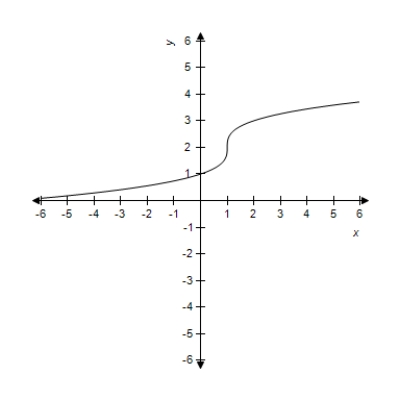
B)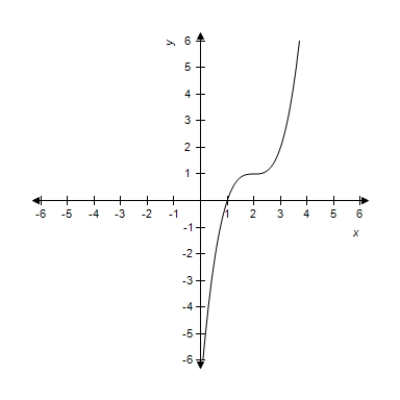
C)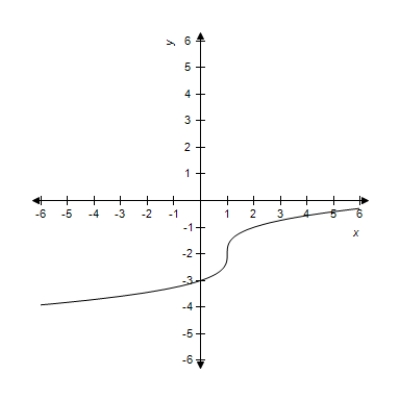
D)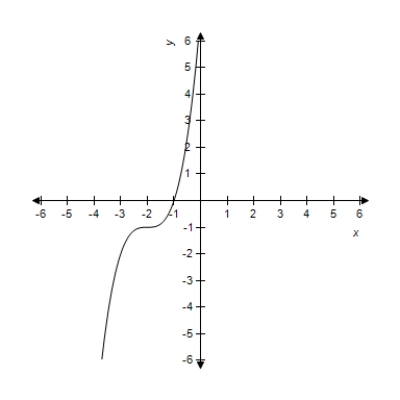
E)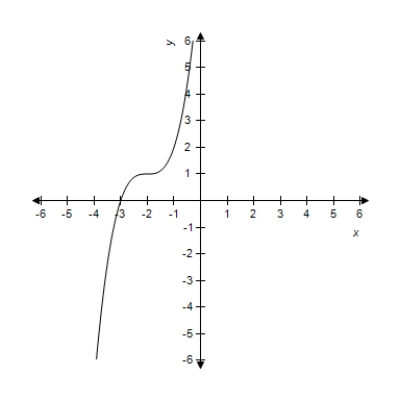

A)

B)

C)

D)

E)


Unlock Deck
Unlock for access to all 113 flashcards in this deck.
Unlock Deck
k this deck
71
Assume that costs and expenses for Continental Divide Mining can be described by  and the sales revenue can be described by
and the sales revenue can be described by  , where t is the number of years since the beginning of 1992. Find the year in which maximum profit occurs.
, where t is the number of years since the beginning of 1992. Find the year in which maximum profit occurs.
A)2014
B)1993
C)2003
D)2004
E)1994
 and the sales revenue can be described by
and the sales revenue can be described by  , where t is the number of years since the beginning of 1992. Find the year in which maximum profit occurs.
, where t is the number of years since the beginning of 1992. Find the year in which maximum profit occurs. A)2014
B)1993
C)2003
D)2004
E)1994

Unlock Deck
Unlock for access to all 113 flashcards in this deck.
Unlock Deck
k this deck
72
Suppose a company has fixed costs of $26,000 and variable costs of  dollars per unit, where x is the total number of units produced. Suppose further that the selling price of its product is
dollars per unit, where x is the total number of units produced. Suppose further that the selling price of its product is  dollars per unit. Find the break-even points. Round your answer to the nearest cent.
dollars per unit. Find the break-even points. Round your answer to the nearest cent.
A)Break-even values are at
And
)
B)Break-even values are at
And
)
C)Break-even values are at
And
)
D)Break-even values are at
And
)
E)Break-even values are at
And
)
 dollars per unit, where x is the total number of units produced. Suppose further that the selling price of its product is
dollars per unit, where x is the total number of units produced. Suppose further that the selling price of its product is  dollars per unit. Find the break-even points. Round your answer to the nearest cent.
dollars per unit. Find the break-even points. Round your answer to the nearest cent.A)Break-even values are at

And

)
B)Break-even values are at

And

)
C)Break-even values are at

And

)
D)Break-even values are at

And

)
E)Break-even values are at

And

)

Unlock Deck
Unlock for access to all 113 flashcards in this deck.
Unlock Deck
k this deck
73
Sketch the graph of the function  .
.
A)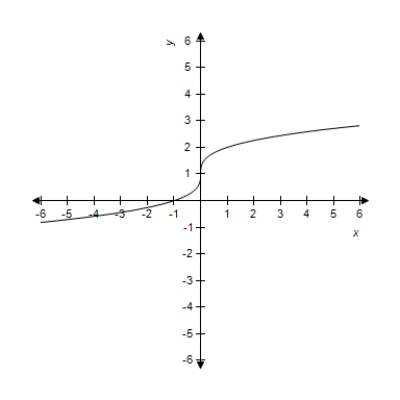
B)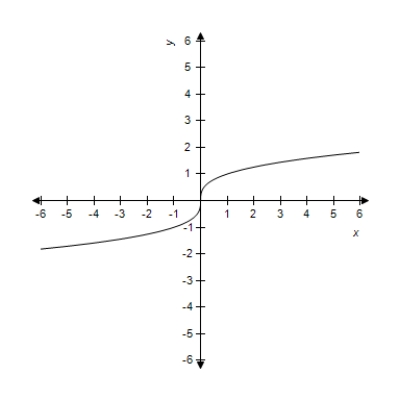
C)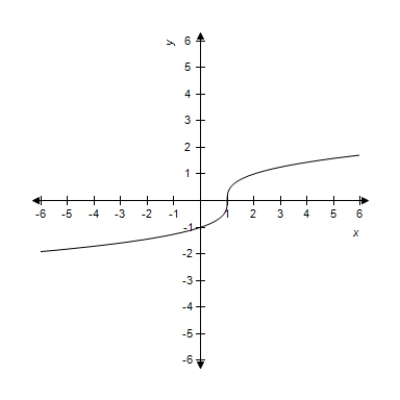
D)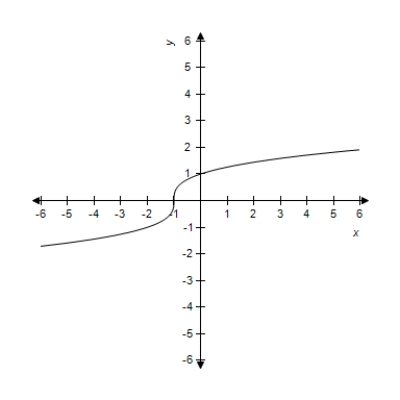
E)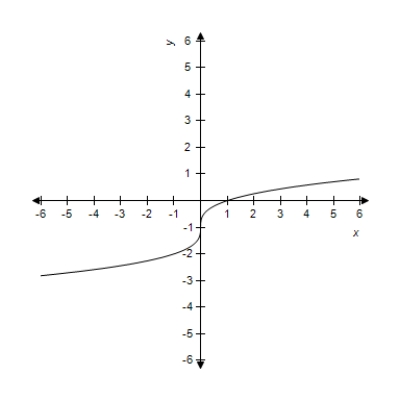
 .
. A)

B)

C)

D)

E)


Unlock Deck
Unlock for access to all 113 flashcards in this deck.
Unlock Deck
k this deck
74
If, in a monopoly market, the demand for a product is  , and the revenue function is
, and the revenue function is  , where x is the number of units sold, what price will maximize revenue? Round your answer to the nearest cent.
, where x is the number of units sold, what price will maximize revenue? Round your answer to the nearest cent.
A)Price that will maximize revenue is
)
B)Price that will maximize revenue is
)
C)Price that will maximize revenue is
)
D)Price that will maximize revenue is
)
E)Price that will maximize revenue is
)
 , and the revenue function is
, and the revenue function is  , where x is the number of units sold, what price will maximize revenue? Round your answer to the nearest cent.
, where x is the number of units sold, what price will maximize revenue? Round your answer to the nearest cent. A)Price that will maximize revenue is

)
B)Price that will maximize revenue is

)
C)Price that will maximize revenue is

)
D)Price that will maximize revenue is

)
E)Price that will maximize revenue is

)

Unlock Deck
Unlock for access to all 113 flashcards in this deck.
Unlock Deck
k this deck
75
Find the maximum revenue for the revenue function  . Round your answer to the nearest cent.
. Round your answer to the nearest cent.
A)$40,500.00
B)$121,500.00
C)$30,375.00
D)$111,375.00
E)$122,500.00
 . Round your answer to the nearest cent.
. Round your answer to the nearest cent.A)$40,500.00
B)$121,500.00
C)$30,375.00
D)$111,375.00
E)$122,500.00

Unlock Deck
Unlock for access to all 113 flashcards in this deck.
Unlock Deck
k this deck
76
Sketch the graph of the function  .
.
A)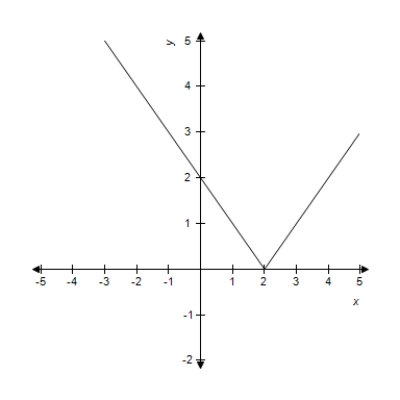
B)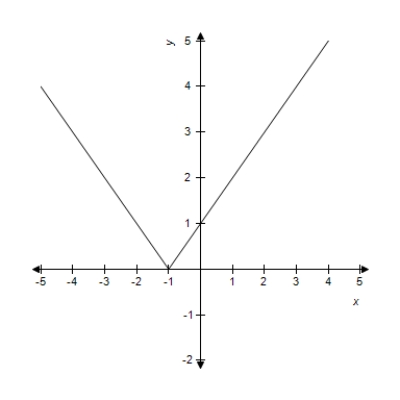
C)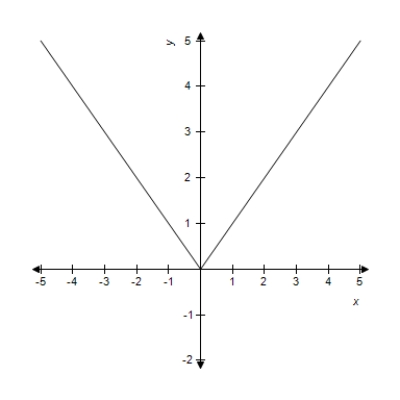
D)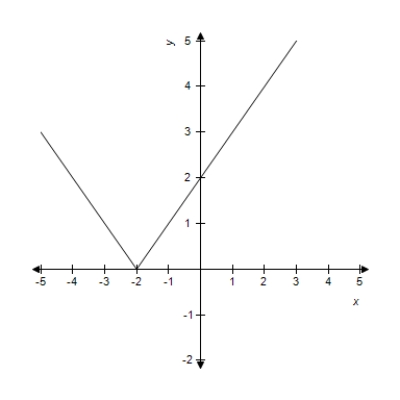
E)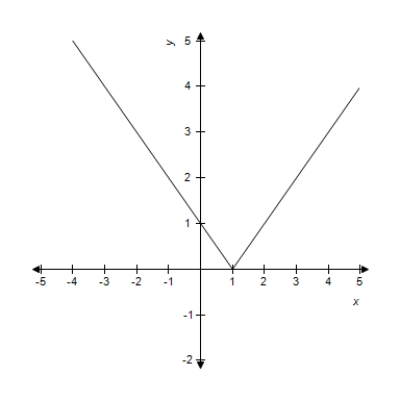
 .
. A)

B)

C)

D)

E)


Unlock Deck
Unlock for access to all 113 flashcards in this deck.
Unlock Deck
k this deck
77
The profit function for a certain commodity is  . Find the level of production that yields maximum profit, and find the maximum profit.
. Find the level of production that yields maximum profit, and find the maximum profit.
A)Production levels of 120 yields a maximum profit of $1,100.
B)Production levels of 120 yields a maximum profit of $2,500.
C)Production levels of 60 yields a maximum profit of $6,040.
D)Production levels of 60 yields a maximum profit of $3,600.
E)Production levels of 60 yields a maximum profit of $2,500.
 . Find the level of production that yields maximum profit, and find the maximum profit.
. Find the level of production that yields maximum profit, and find the maximum profit. A)Production levels of 120 yields a maximum profit of $1,100.
B)Production levels of 120 yields a maximum profit of $2,500.
C)Production levels of 60 yields a maximum profit of $6,040.
D)Production levels of 60 yields a maximum profit of $3,600.
E)Production levels of 60 yields a maximum profit of $2,500.

Unlock Deck
Unlock for access to all 113 flashcards in this deck.
Unlock Deck
k this deck
78
Use a graphing calculator to graph the profit function  .
.
A)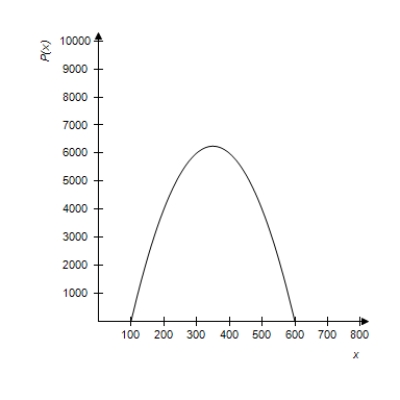
B)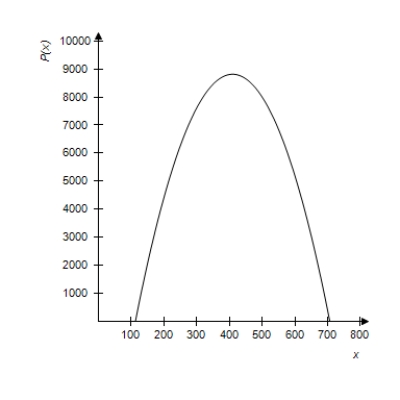
C)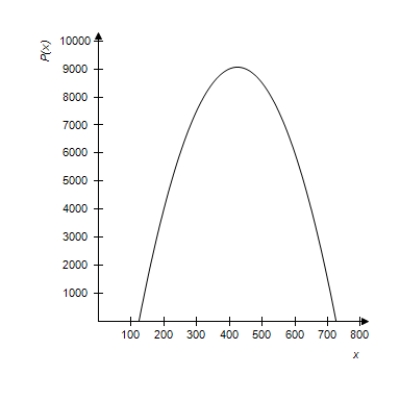
D)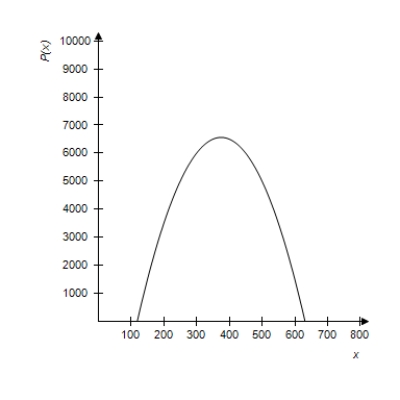
E)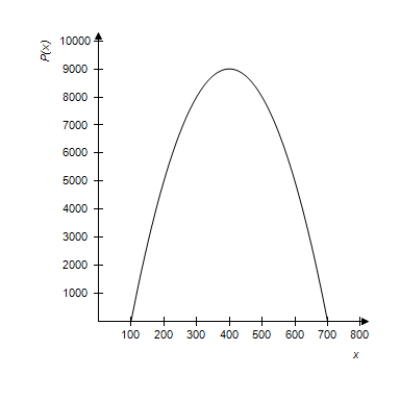
 .
. A)

B)

C)

D)

E)


Unlock Deck
Unlock for access to all 113 flashcards in this deck.
Unlock Deck
k this deck
79
Sketch the graph of the function  .
.
A)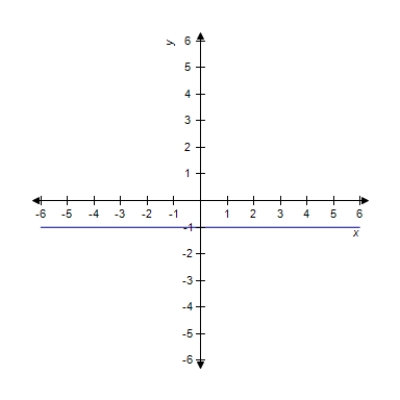
B)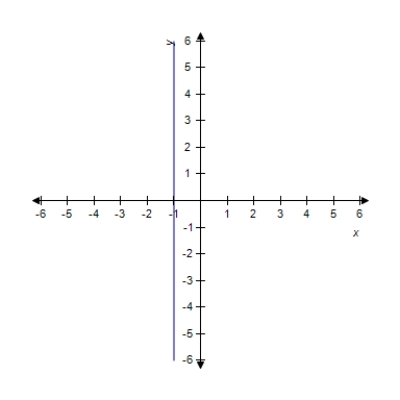
C)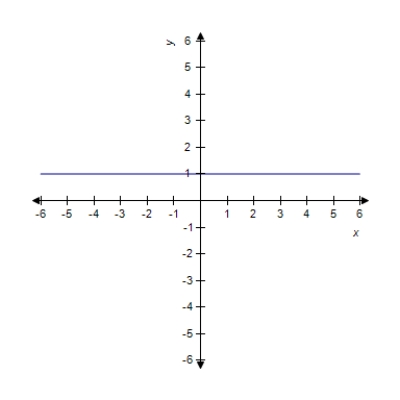
D)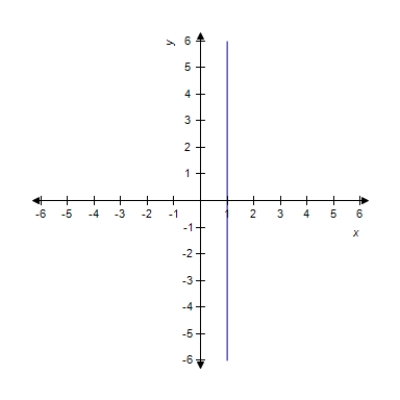
E)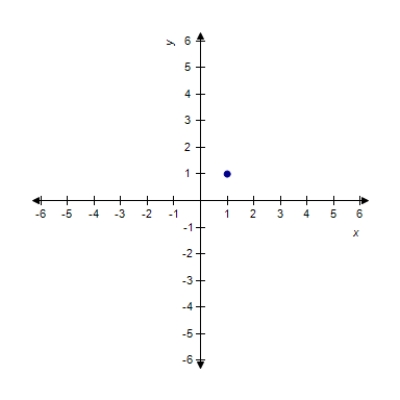
 .
. A)

B)

C)

D)

E)


Unlock Deck
Unlock for access to all 113 flashcards in this deck.
Unlock Deck
k this deck
80
Assume that sales revenues for Continental Divide Mining can be described by  , where t is the number of years past 1992. Use the function to determine the year in which maximum revenue occurs.
, where t is the number of years past 1992. Use the function to determine the year in which maximum revenue occurs.
A)Maximum revenue occurred during 2001.
B)Maximum revenue occurred during 1992.
C)Maximum revenue occurred during 2000.
D)Maximum revenue occurred during 2009.
E)Maximum revenue occurred during 1991.
 , where t is the number of years past 1992. Use the function to determine the year in which maximum revenue occurs.
, where t is the number of years past 1992. Use the function to determine the year in which maximum revenue occurs. A)Maximum revenue occurred during 2001.
B)Maximum revenue occurred during 1992.
C)Maximum revenue occurred during 2000.
D)Maximum revenue occurred during 2009.
E)Maximum revenue occurred during 1991.

Unlock Deck
Unlock for access to all 113 flashcards in this deck.
Unlock Deck
k this deck


